| Listing 1 - 6 of 6 |
Sort by
|
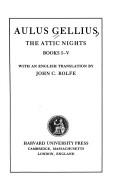
ISBN: 0674992156 0674992202 9780674992153 9780674992344 Year: 1928 Volume: 195, 200, 212 Publisher: London : W. Heinemann,
Abstract | Keywords | Export | Availability | Bookmark
 Loading...
Loading...Choose an application
- Reference Manager
- EndNote
- RefWorks (Direct export to RefWorks)
Aulus Gellius (ca. 123-170 CE) is known almost wholly from his Noctes Atticae, 'Attic Nights', so called because it was begun during the nights of an Attic winter. The work collects in twenty books (of Book VIII only the index is extant) interesting notes covering philosophy, history, biography, all sorts of antiquities, points of law, literary criticism, and lexicographic matters, explanations of old words and questions of grammar. The work is valuable because of its many excerpts from other authors whose works are lost; and because of its evidence for people's manners and occupations. Some at least of the dramatic settings may be genuine occasions. The Loeb Classical Library edition of Attic Nights is in three volumes.
Civilization, Greco-Roman --- Latin essays --- Rome --- Histoire --- History --- Verse satire, Latin --- Latin letters --- Translations into English.
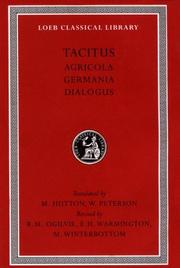
ISBN: 0674990390 0674991230 0674992741 0674993454 0674993551 9780674991231 Year: 2006 Volume: 35, 111, 249, 31 Publisher: Cambridge Harvard university press
Abstract | Keywords | Export | Availability | Bookmark
 Loading...
Loading...Choose an application
- Reference Manager
- EndNote
- RefWorks (Direct export to RefWorks)
Tacitus (c. 55-c. 120 CE), renowned for concision and psychology, is paramount as a historian of the early Roman empire. What survives of Histories covers the dramatic years 69-70. What survives of Annals tells an often terrible tale of 14-28, 31-37, and, partially, 47-66.
Rome --- History --- Historiography. --- History. --- Latin letters --- Germanic peoples --- Translations into English.
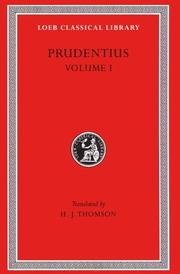
ISBN: 0674994264 9780674994386 0674994388 Year: 1995 Publisher: Cambridge Harvard university press
Abstract | Keywords | Export | Availability | Bookmark
 Loading...
Loading...Choose an application
- Reference Manager
- EndNote
- RefWorks (Direct export to RefWorks)
Prudentius (Aurelius Prudentius Clemens) was born in 348 CE probably at Caesaraugusta (Saragossa) and lived mostly in northeastern Spain, but visited Rome between 400 and 405. His parents, presumably Christian, had him educated in literature and rhetoric. He became a barrister and at least once later on an administrator; he afterwards received some high honour from Emperor Theodosius. Prudentius was a strong Christian who admired the old pagan literature and art, especially the great Latin poets whose forms he used. He looked on the Roman achievement in history as a preparation for the coming of Christ and the triumph of a spiritual empire. The Loeb Classical Library edition of the poems of Prudentius is in two volumes. Volume I presents: "Preface" (Praefatio); "The Daily Round" (Liber Cathemerinon); 12 literary and attractive hymns, parts of which have been included in the Breviary and in modern hymnals; "The Divinity of Christ" (Apotheosis), which maintains the Trinity and attacks those who denied the distinct personal being of Christ; "The Origin of Sin" (Hamartigenia) attacking the separation of the 'strict' God of the Old Testament from the 'good' God revealed by Christ; "Fight for Mansoul" (Psychomachia), which describes the struggle between (Christian) Virtues and (Pagan) Vices; and the first book of "Against the Address of Symmachus" (Contra Orationem Symmachi), in which pagan gods are assailed. The second volume contains the second book of "Against the Address of Symmachus," opposing a petition for the replacement of an altar and statue of Victory; "Crowns of Martyrdom" (Peristephanon Liber), 14 hymns to martyrs mostly of Spain; "Lines To Be Inscribed under Scenes from History" (Tituli Historiarum), 49 four-line stanzas which are inscriptions for scenes from the Bible depicted on the walls of a church; and an Epilogue.
Latin letters --- Kingdom of God --- Translations into English. --- Didactic poetry, Latin.
Book
ISSN: 07501978 ISBN: 9782204128650 2204128651 Year: 2018 Volume: 597 Publisher: Paris Les éditions du Cerf
Abstract | Keywords | Export | Availability | Bookmark
 Loading...
Loading...Choose an application
- Reference Manager
- EndNote
- RefWorks (Direct export to RefWorks)
Riche de près de 300 pièces, la correspondance d’Alcuin, conseiller de Charlemagne et, à partir de 796, abbé de Saint-Martin de Tours, est sans équivalent à cette époque. Recueillie par son ami Arn, archevêque de Salzbourg, la première collection, comprenant vingt pièces, est ici éditée avec un nouveau texte critique et traduite pour la première fois en français. Datable de 799, c’est la seule qui ait été établie du vivant du maître d’oeuvre de la réforme carolingienne.Adressées à Arn, à des moines, à des élèves ou à d’anciens élèves, à Charlemagne lui-même ou à la reine Edilthrude, ces vingt lettres illustrent divers genres : consolation, précis exégétique, manuel pastoral, miroir du prince ou de l’évêque, et même « tombeau ». Le clerc anglo-saxon y fait la part belle à la Bible, à la poésie, tout en s’inspirant de Jérôme, d’Augustin, bien sûr, de Grégoire le Grand plus encore.Mais c’est surtout sa capacité à réagir à une situation nouvelle – la résurgence d’une hérésie, l’apparition de certaines pratiques – et à être un homme de son temps, soucieux d’une évangélisation pacifique des païens, de l’éducation des enfants, de la promotion des laïcs et des prêtres, de l’intégrité des évêques, du rôle majeur qu’un souverain comme Charlemagne peut jouer, qui fait l’attrait principal de ces Lettres.
Alcuin, --- Latin letters, Medieval and modern --- Theology --- Manuscrits latins --- Édition critique. --- Alcuin --- Correspondance. --- Theologische teksten (Middeleeuwen) --- Alcuin, - 735-804 - Correspondence --- Alcuin, - 735-804
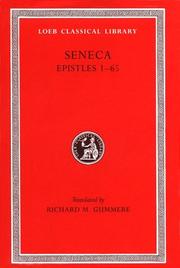
ISBN: 0674990846 9780674990845 0674990854 9780674990852 0674990862 9780674990869 Year: 1996 Publisher: Cambridge, Mass. Harvard University Press
Abstract | Keywords | Export | Availability | Bookmark
 Loading...
Loading...Choose an application
- Reference Manager
- EndNote
- RefWorks (Direct export to RefWorks)
Seneca, Lucius Annaeus, born at Corduba (Cordova) ca. 4 BCE, of a prominent and wealthy family, spent an ailing childhood and youth at Rome in an aunt's care. He became famous in rhetoric, philosophy, money-making, and imperial service. After some disgrace during Claudius' reign he became tutor and then, in 54 CE, advising minister to Nero, some of whose worst misdeeds he did not prevent. Involved (innocently?) in a conspiracy, he killed himself by order in 65. Wealthy, he preached indifference to wealth; evader of pain and death, he preached scorn of both; and there were other contrasts between practice and principle. We have Seneca's philosophical or moral essays (ten of them traditionally called Dialogues)--on providence, steadfastness, the happy life, anger, leisure, tranq.
Latin letters. --- Authors, Latin --- Latin literature --- Seneca, Lucius Annaeus, --- Seneca, Lucius Annaeus --- Sénèque --- Seneca --- Annaeus Seneca, Lucius, --- Seneca, Annaeus, --- Seneca, --- Seneca, L. A. --- Seneca, Lucio Anneo, --- Seneka, --- Seneka, L. Annėĭ, --- Sénèque, --- סנקא, לוציוס אנאוס --- Pseudo-Seneca --- Latin letters --- Rome --- Poetry.
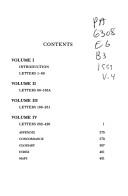
ISBN: 0674995716 0674995724 0674995732 0674995406 9780674995710 9780674995406 9780674995734 9780674995727 Year: 1999 Volume: 7-8, 97, 491 Publisher: Cambridge (Mass.): Harvard university press
Abstract | Keywords | Export | Availability | Bookmark
 Loading...
Loading...Choose an application
- Reference Manager
- EndNote
- RefWorks (Direct export to RefWorks)
In letters to his dear friend Atticus, Cicero reveals himself as to no other of his correspondents except, perhaps, his brother. These letters, in this four-volume series, also provide a vivid picture of a momentous period in Roman history-years marked by the rise of Julius Caesar and the downfall of the Republic. When the correspondence begins in November 68 BCE the 38-year-old Cicero is a notable figure in Rome: a brilliant lawyer and orator, who has achieved primacy at the Roman bar and a political career that would culminate in the Consulship in 63. Over the next twenty-four years-to November 44, a year before he was put to death by the forces of Octavian and Mark Antony-Cicero wrote frequently to his friend and confidant, sharing news and discussing affairs of business and state. It is to this corpus of over 400 letters that we owe most of our information about Cicero's literary activity. And taken as a whole the letters provide a first-hand account of social and political life in Rome.
Authors, Latin --- Latin letters --- Statesmen --- Correspondence. --- Translations into English. --- Cicero, Marcus Tullius --- Atticus, Titus Pomponius --- -Latin letters --- -Statesmen --- -Correspondence --- Translations into English --- Correspondence --- -Cicero, Marcus Tullius --- -Public officers --- Latin literature --- Authors, Roman --- Latin authors --- Roman authors --- -T︠S︡it︠s︡eron, Mark Tulliĭ --- Cyceron --- Cicéron --- Kikerōn --- Cicerón, M. Tulio --- Ḳiḳero --- Cicerone --- Cicerón, Marco Tulio --- Ḳiḳero, Marḳus Ṭulyus --- Tullius Cicero, Marcus --- Kikerōn, M. T. --- Cicerone, M. T. --- Cicerone, M. Tullio --- Cicero --- Cicero, M. T. --- Cyceron, Marek Tulliusz --- ציצרון, מארקוס טולליוס --- קיקרו, מארקוס טוליוס --- קיקרו, מרקוס טוליוס --- キケロ --- 西塞罗 --- Atticus, Pomponius --- Pomponius, Titus --- Pomponianus, Quintus Caecilius --- -Authors, Roman --- Cicéron, Marcus --- Lettres (Genre littéraire) latines --- Hommes d'Etat --- Ecrivains latins --- Traductions anglaises --- Correspondance --- Lettres (Genre littéraire) latines --- -Atticus, Pomponius --- -Cicero --- Rome --- Authors [Latin ] --- Atticus, Titus Pomponius - Correspondence. --- Latin letters - Translations into English. --- M. Tulli Ciceronis --- T︠S︡it︠s︡eron, Mark Tulliĭ --- -Latin literature --- Statesmen - Rome - Correspondence --- Authors, Latin - Correspondence. --- Letters.
| Listing 1 - 6 of 6 |
Sort by
|

 Search
Search Feedback
Feedback About UniCat
About UniCat  Help
Help News
News